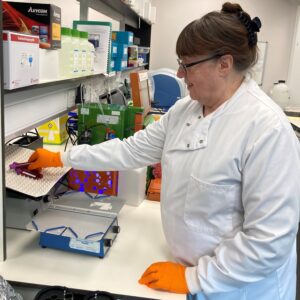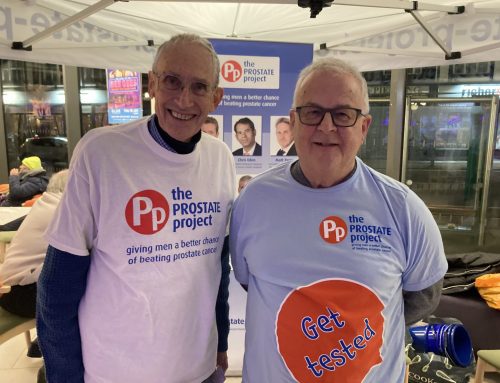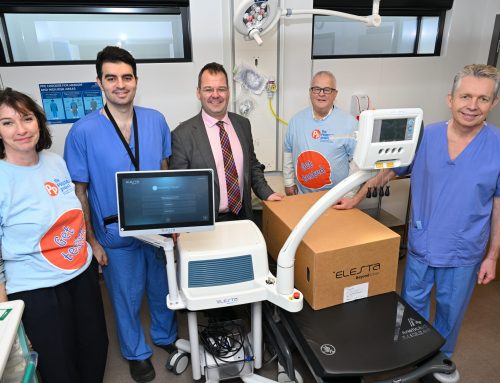
Britain’s first screening programme for prostate cancer launches today in an effort to reduce the death toll from the disease.
The Daily Mail reports, up to 12,000 men in the South of England will be tested for the disease over the next year or so, as part of a scheme that could be rolled out across the UK if it proves successful at detecting ‘hidden’ cancers in men with no symptoms.
In the near future, the Prostate Project Mobile PSA Testing Clinic will provide additional support in targeting men and providing PSA testing. The Surrey and Sussex Cancer Alliance is working with the Prostate Project, which is currently fundraising to provide the mobile unit which will travel to targeted locations across Surrey and Sussex. The charity is over half way to achieving our £200,000 target.

The men will undergo a prostate-specific antigen test, which looks for raised levels of the PSA protein in their blood. Raised PSA can indicate the presence of prostate cancer cells.
The PSA test is currently usually offered only to men showing possible symptoms of prostate cancer (such as urinating more often or blood in their urine) or those with a strong family history of the disease.
The project, which has funding from NHS England of around £750,000, is being run by Surrey and Sussex Cancer Alliance, a body made up of NHS doctors, charities and cancer patients which oversees cancer care across the two counties.
All men aged 50 to 70 in the new scheme’s catchment area will be offered the chance to attend their local GP surgery for a PSA test.
Priority will go to those likely to be most at risk, such as black men (at greater risk because they have more genetic mutations that predispose them to the disease) or men who have a close family member who was also affected. In these groups, men over 45 will be targeted.
The Alliance is working with more than 50 GP surgeries in the area to identify those who will be offered PSA testing.

‘We hope to save many men’s lives,’ says Prostate Project Trustee, Professor Stephen Langley, director of urology at the Royal Surrey County Hospital in Guildford, and clinical lead for the Surrey and Sussex Cancer Alliance.
‘The cure rate for prostate cancer that is detected early is high — up to 90 per cent.
‘But by the time it has spread to other parts of the body, a cure is normally not possible.
‘And we need to address the impact of the Covid-19 pandemic, because in our region alone we have seen referrals for suspected prostate cancer drop to just 60 or 70 per cent of the normal rate, due to men not being able to see their doctors.
‘We have a duty to do what we can to try to help men who may have cancer and not know it.’
Prostate cancer affects around 47,000 men a year in the UK and kills almost 12,000 annually.
If it’s caught early and before it has spread beyond the prostate, there is a good chance of survival. But in about 10 per cent of cases it has already spread to other organs by the time it is picked up, after which the chances of living more than two years are slim.
Treatment for these men simply aims to slow tumour growth with chemotherapy, or by reducing levels of testosterone, a hormone that helps prostate cancer cells to grow.
One of the reasons why thousands of men each year are diagnosed only when the disease has spread is because, in the early stages, few have the known symptoms — including urinating more frequently, difficulty urinating, weak urinary flow or blood in the urine or semen.
Actor and comedian Stephen Fry revealed he had no signs of illness at all when he was diagnosed with prostate cancer in 2017. He later said: ‘I was pretty knocked back — I had no symptoms to indicate anything was wrong. Thankfully, it was caught early, making it more treatable.’
Raised levels of PSA can indicate the presence of prostate cancer cells. However, this can also be due to a range of other factors, such as a urinary infection, an enlarged prostate, vigorous exercise or having had sex within the previous 48 hours.
As a result, the PSA test has not been considered accurate enough to justify being used in a national prostate screening programme — such as that for breast and cervical cancer for women.
The UK National Screening Committee, which advises the Government on which diseases to routinely check for, has in the past ruled out using the PSA test for a nationwide screening programme because it says it is not reliable enough.
The worry was that if a national scheme went ahead, thousands of men with high PSA readings could end up enduring painful biopsies (where tiny samples of tissue are removed from the prostate to check for a tumour) when they didn’t actually have cancer at all, or had a tumour that was so slow-growing it was highly unlikely to kill them.
Some prostate tumours are aggressive and grow rapidly, while others progress so slowly that the patient almost always dies of something else before it ever gets to be a problem.
These two types are often colloquially referred to as ‘tigers’ and ‘pussycats’.
Under the Surrey and Sussex pilot scheme, men with raised PSA readings will only undergo a biopsy once they have also had an MRI scan (which generates detailed images of the prostate) to give vital clues as to whether it’s cancer, how big the cancer is and whether it appears to be at risk of spreading.

‘PSA is not a perfect test and it has had a bad press down the years,’ says Professor Langley.
‘But some large studies suggest it is about as effective as breast cancer screening in terms of picking up early cancers.’
The European study of screening for prostate cancer, a long-running investigation into the value of PSA testing, found that it reduced deaths by up to 22 per cent over an 11-year period, according to results published in The Lancet in 2014.
‘Men in our pilot project will have a biopsy only if the MRI scan results warrant it — we hope to distinguish not only that the raised PSA is due to cancer, but to separate the tigers from the pussycats at an early stage and, in the process, reduce the rate of unnecessary biopsies by up to 30 per cent,’ says Professor Langley.
‘One in eight men will get prostate cancer at some point in their lives. ’
Men taking part in the scheme will first be asked to submit a urine sample, to rule out an infection that might give a false high PSA reading.
If they then have raised PSA levels — above 3ng/ml — they will be referred straight to their local hospital, rather than have to go back to their GP for a referral for an MRI.
‘We are streamlining the pathway so these men get referred for prompt assessment within two weeks,’ says Dr Ed Bosonnet, primary care director for Medefer, a digital healthcare company which is taking part in the project. “We are dedicated to working with the NHS to reduce the cancer backlog and improve patient care, so we are delighted to be partnering with the Surrey and Sussex Cancer Alliance to shape and deliver this important service.”
The hope eventually is to provide men with both urine tests and PSA tests — using a finger-prick blood test similar to those used in diabetes — that they can do at home. The idea is they would then be able to log their readings on a website.
Dr Alex Norman, Medical Director at Surrey and Sussex Cancer Alliance, says: “This highly innovative, non-invasive approach will help us identify those most at risk for prostate cancer. And for those men that have not come forward this will make it really easy for them to have a test. We are taking the test to them. As with any illness, catching it early means it is more likely to be cured.”
Read more on the Surrey and Sussex Cancer Alliance website



